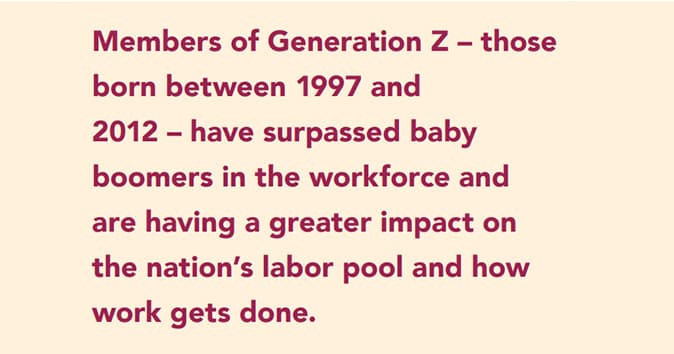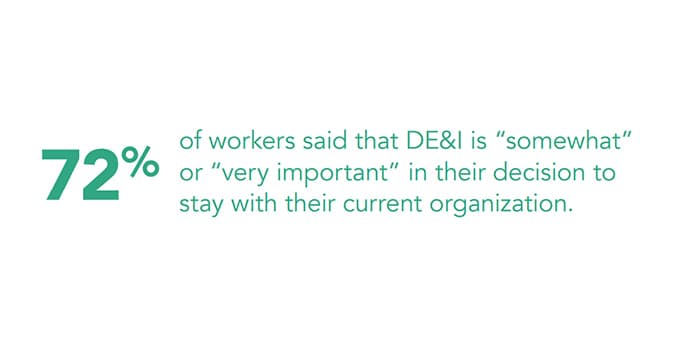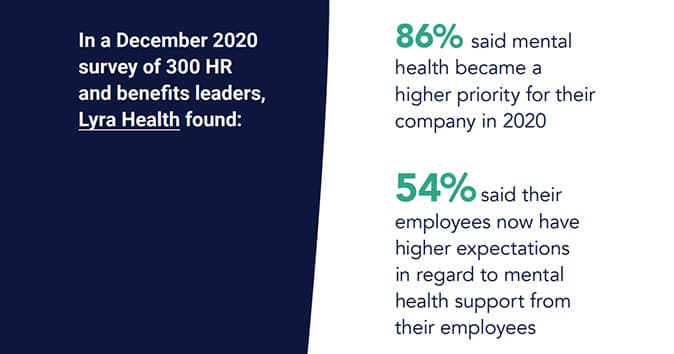Understanding Gen Z in the Workplace

By 2025, 30% of the workforce will be comprised of Generation Z, or individuals born between 1997 and 2012, as discussed in the article on Gen Z in the Workplace: How Technology Can Increase Happiness at WorkOpens in a new tab'' by Homebase.
While these young people are often criticized for being digital natives or having radical social values, their progressive nature makes them great assets to any company that values innovation.
Read on to learn what makes Generation Z so brilliantly unique, what you can do to meet these employees’ unique needs in the workplace, and how your organization can benefit from these young workers’ strengths.
What defines Gen Z in the workplace?
“Generation Z” refers to the group of individuals born between 1997 and 2012. Born in the height of the digital age, Gen Z is known for being tech-savvy, politically progressive, and extremely purpose-driven.

Let’s break down some of the notable characteristics of this new generation of workers:
Digital natives
Gen Z babies were practically born with iPhones in their hands. These individuals are highly skilled at navigating the internet, digital technology, and social media, as these things have always been a part of their lives, rather than new tools they had to learn to navigate later on.
Information is highly available to them, and they often use their devices to learn new skills and research topics that interest them.
While Gen Zs are often mocked for their reliance on mobile devices and Apple products or their affinity for Instagram, the perspective that they are “less than” because of their habits or differences is deeply problematic. Older generations were never critiqued to the same degree for taking advantage of the resources available to them.
It’s important to remember that the wristwatch, the printing press, and even sliced bread were all considered newfangled “advances” when they were created. One day, the ubiquitous smartphone will be viewed as an equally archaic invention.
Diverse, inclusive, and progressive
Generation Z is the most diverse generation in American history. Not only is there more racial, gender, and ethnic diversity in this generation, but more individuals in this age group also self-identify as LGBTQ+ than ever before.
For these reasons, it should come as no surprise that Gen Zs have more progressive, inclusive values and political leanings than many of their parents and grandparents. These individuals are often extremely passionate about social and environmental justice, fighting for their vision of a safer, more equitable world.
Because of their focus on these values, Gen Zs tend to be intensely purpose-driven, both in their personal and professional lives.
Gen Z employees tend to value DE&I more than employees from prior generations. They seek out workplaces that value individual contributions and expressions, have diversity in leadership, and emphasize the importance of their Employee Resource Groups (ERGs).
Many of them are also drawn to companies that care deeply about climate change and monitor their carbon footprints, aligning with their vision of a brighter future and better world for everyone.

Authentic, transparent, and independent
Generation Z will never be known for mincing their words. Born advocates and activists, these free-thinkers are strong, opinionated, and unafraid to fight for what’s right. They deeply value authentic communication, transparent dialogue, and being able to function independently, especially in professional settings.
Their communication style tends to be concise and informal. 75% of them also prefer to have difficult conversations over text rather than over the phone.
At work, Generation Z expects clear instructions, direct communication, and regular feedback. They don’t appreciate “fluff,” corporate jargon, or any form of beating around the bush. They also prefer to work autonomously and don’t appreciate any form of micromanagement, often setting very strong boundaries for themselves in the workplace.
Health and wellness-conscious
Placing higher value on physical health than Millennials, Gen Xers, or Baby Boomers did at the same age, many Gen Zers choose not to engage in drinking alcohol or smoking tobacco. They were also privy to more consistent, accurate information about nutrition and exercise from a young age, leaving behind the wild yo-yo diets and laughable “health” crazes of previous generations.
Generation Z is also known for speaking openly about struggles regarding mental health, especially depression and anxiety. For many individuals in this generation, the rise in violent crimes, media saturation, the constant barrage of “bad news,” the COVID-19 pandemic, and coming of age in such uncertain economic times have all exacerbated underlying mental health issues.
Pragmatic and focused on finances
The new generation of workers knows the worth of their labor and doesn’t want to settle for lessOpens in a new tab when it comes to compensation. They know how to advocate for themselves and the workforce as a whole, with many Gen Zers being staunch advocates for more pay and workers’ rights. Gen Zs are also known for being extremely ambitious, confidently chasing promotions and higher salaries.
What are Gen Zs unique needs in the workplace?
The Gen Z workforce values different elements of their careers than many employees from older generations. These young employees have specific needs at work due to the differences in the world they were raised in.
To attract and retain Gen Z employees, employers need to foster a workplace culture that is aligned with their values and catered to their strengths.
This can include:
Top-of-the-line technology
Because they’re digital natives who value convenience, Gen Zers tend to have even higher expectations for technology in the workplace than the millennial generation. These young workers don’t like to waste time fumbling with archaic tools or workflows, and often seek out professional settings where they have access to the newest devices and programs.
They also value the automation of menial tasks and often leverage technology to help them work more efficiently and accurately.
In fact, one-third of Gen Z employees expect their employers to provide them with modernized equipment, and one in five say they won’t tolerate experiences with subpar technology.
Learning and development opportunities
Gen Zers deeply value learning new skills and progressing in their careers. In fact, 76% of Gen Z respondents reported that they’re looking for professional training and development opportunities.
Nearly one in five workers from this generation report being more likely to stay with an employer who offered reskilling, education, or upskilling as part of their professional development planning.
Strong employer brand
Members of Generation Z are more concerned with an employer's brand presence than their Millennial, Gen X, or Baby Boomer counterparts. As job seekers, these young people are more likely to assess a company's social media presence and impact, as well as their values and organizational culture.
It's important for them to take into consideration how a company is viewed by its clients and current employees before deciding to even interview there.
Mental health support
Unfortunately, most of the Gen Zers surveyed reported not feeling like they had adequate mental health support in the workplace.
Less than half of the employees surveyed agreed that their boss helps them maintain a healthy workload. 28% reported that they struggle with their mental health, both in and outside the workplace.
Offering mental health services to employees through your insurance plan can be a great way to make these individuals feel cared for and ensure they have the resources they need to thrive.

Alignment with lifestyle and values
While Gen Zs value job security, they also believe that their career development and success is within their control and dependent on their actions. While they value professional and financial stability, they’re also unafraid of entrepreneurship and taking risks.
Gen Zers often seek out roles or companies that align with their personal values or work toward measurable positive social change. When applying for new jobs, they look for people-first organizations that value the employee experience, fostering a solid work-life balance and deeper job satisfaction.
Due to this, some members of Gen Z value mission-driven, interesting work over less fulfilling jobs with higher salaries.
What are some common challenges of managing employees from Generation Z?
Just as Gen Z employees bring unique strengths to the workplace, they also bring their own unique, varied set of challenges. Understanding these challenges can help managers tailor their leadership styles to better manage young employees. Some common sticking points may include:
Desire for more praise or validation
Because of the culture Generation Z was raised in, many of them are used to being praised for their participation in activities rather than "winning." This was a conscious effort orchestrated by Gen X parents to help their children build self-esteem and feel included without the constant sensation of being under pressure to perform.
However, because of this mindset, many Gen Zers are used to more praise or validation than other generations and may seek this out in professional settings.
Need for professional autonomy
Because they so greatly value individuality and self-expression, many Gen Z employees also deeply value professional freedom and autonomy. They tend to feel most at ease when they can be independent and fully express their ideas and creativity. Gen Zers are particularly sensitive to being micromanaged in any way.
Accustomed to simplicity and instant gratification
Because they grew up in a digital world with so much available at the touch of a button, Gen Zers are used to seamless experiences and instant gratification.
Because of this, some employees from this generation may come across as entitled or impatient simply because they're accustomed to a much faster pace of life. However, this can also have upsides, as these employees are very sensitive to wasting time and like to work as efficiently as possible.
Less company loyalty than any previous generation
Members of previous generations were more inclined to stay with companies for longer periods. In the prior world of work, this was seen as a choice with high esteem and often had a lot of benefits for the employees, such as pensions and other perks.
However, now that these benefits are no longer as common, many younger employees switch jobs every few years, which enables them to earn at a higher level than staying put and waiting for promotion cycles.
Constantly seeking better-paying jobs empowers them to create and sustain a better sense of financial security in today's uncertain economic landscape.
FAQs
What are the key challenges in managing Gen Z's mental health?
One of the main challenges is maintaining a sense of psychological safety. Because Gen Zers witnessed so many ongoing crises during their formative years, many of them have deeper struggles with anxiety and depression than members of previous generations.
To help address this, employers should encourage open dialogue in the workplace and maintain a safe space to speak about current events and concerns of any size.
What strategies can employers use to promote diversity and inclusion for Gen Z?
The most important thing employers can do to support DEI, especially for Generation Z, is to be open to learning and feedback. While corporate diversity initiatives are usually well-intentioned, their impact can be lessened if things come across as performative, disingenuous, or simply done to “check a box.”
By staying aware of ever-evolving language, maintaining unbiased hiring practices, and taking feedback gracefully when diversity initiatives miss the mark, companies can bolster their DEI efforts and set themselves up for success in the future.
How can companies support Gen Z's career growth and development?
To help these young adults thrive in the professional sphere, leaders should make sure they’re providing these employees with all the tools and resources they need to succeed. These can include open communication, up-to-date tools and technology, learning and development opportunities, and mental health support.
Wrapping Up
Attracting Gen Z employees begins with deepening your understanding of their working styles, values, and professional expectations.
However, since every business and individual is unique, polling or employees as a group or speaking to them individually can help you tailor strategies to your team and organization.
While Generation Z’s defining traits and preferences are often mocked or looked down upon, members of this diverse generation can be great assets to any organization when provided with the tools they need to thrive.
By arming yourself with knowledge on how to meet the needs of these young workers, you'll be able to build mutually beneficial professional relationships.
This will help your team attract Gen Zers who can help you stay aware of emerging trends, explore fresh ideas and opportunities, and stay nimble in an ever-evolving world of work.
About the author
Anna Picagli
As an RYT500 yoga instructor and a Reiki Master Teacher, Anna is an advocate for holistic wellness, especially within the workplace. She’s extremely passionate about the brain-body connection and exploring how mental and physical wellness intersect.
Anna has experienced firsthand how chronic stress, overworking, poor management, and other organizational issues can lead to extreme burnout. Knowing the impact that a toxic work environment can have on a person’s body, psyche, and general sense of well-being, she now works to direct others away from facing the same fate.
As Workhuman’s Senior Content Specialist, Anna is a regular contributor to Workhuman iQ reports and aims to create resources that company leaders can reference to help improve their culture and empower their employees, creating healthier workplaces for everyone.
In her free time, she’s an avid solo traveler, a voracious reader, and a seasoned home chef. You can learn more about Anna’s work on LinkedIn or through the Yoga Alliance.